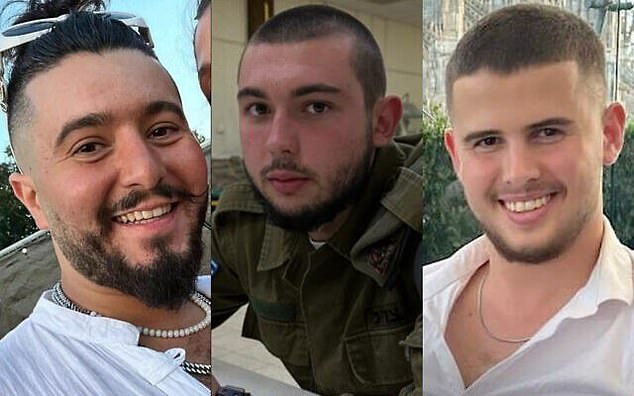Israel has admitted there is a “high probability” its military killed three hostages taken by Hamas in an air strike in November.
The bodies of Corporal Nik Beizer, Sergeant Ron Sherman and French-Israeli Elia Toledano were returned to Israel in December after they were taken by Hamas militants during the deadly October 7 raid.
The IDF said in a statement today that the three men “were killed as a result of a byproduct of an IDF airstrike, during the elimination of Hamas Northern Brigade commander Ahmed Ghandour on November 10, 2023.”
The military said the men were in a tunnel complex where Hamas’s top commander was hiding.
“At the time of the attack, the IDF had no information about the presence of hostages in the attacked compound,” the army said.
‘In addition, there was information suggesting they were located elsewhere, so the area was not designated as one with a suspected hostage presence.’
From left to right: Elia Toledano, Corporal Nik Beizer, Sergeant Ron Sherman, who were killed in an IDF attack in November.
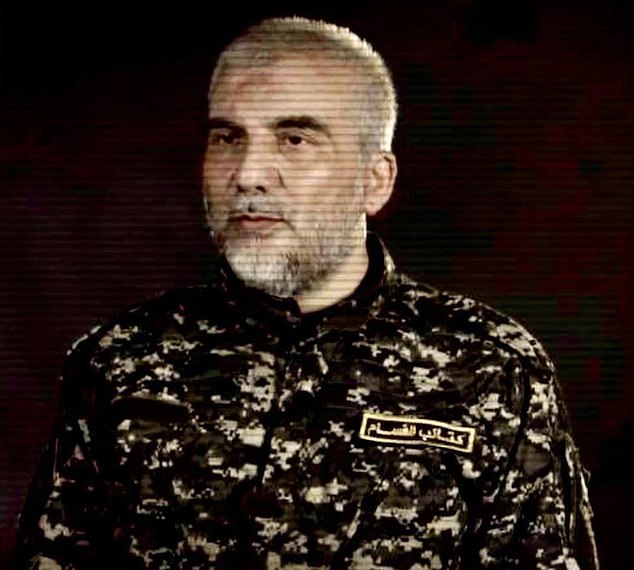
The three hostages were killed in an IDF strike that aimed to eliminate senior Hamas commander Ahmed Ghandour (pictured).
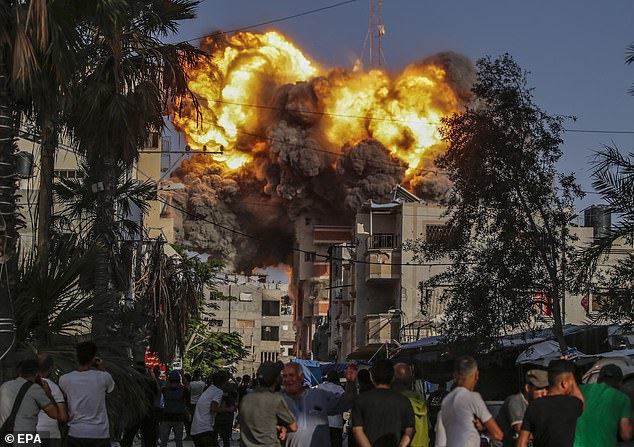
Explosion following an Israeli airstrike in the Al-Bureije refugee camp in the southern Gaza Strip, June 3, 2024
A spokesperson for the Hostage Families Forum told MailOnline: “This highlights the serious risk to the lives of hostages in captivity. Every moment that passes puts them further in danger.”
“We know that the hostages are being held in inhumane conditions, tortured by Hamas and deprived of their basic human rights. The only way to ensure their safe return is through a negotiated settlement and not through military pressure.”
The retaliatory invasion of the Gaza Strip, now in its 11th month, has been widely condemned by Israelis, many of whom have been marching to end the war.
Photographs from Tel Aviv and Jerusalem taken over the past few weeks showed countless Israelis marching to protest Prime Minister Benjamin Netanyahu’s decision to continue the military operation in Gaza, accusing him of not doing enough to reach a ceasefire deal to free the remaining 97 hostages.
The conflict has spilled over into the Middle East, where Iran and allied militant groups have attacked Israeli and U.S. targets and have been met with retaliation from Israel and its Western allies. On several occasions, the attacks and counterattacks have threatened to spark a wider conflict.
A missile launched by Iran-backed Yemeni rebels landed in an open area in central Israel early Sunday, setting off air raid sirens at its international airport, the latest fallout from the nearly year-long war in Gaza. Israel signaled it would respond militarily.
There were no reports of casualties or major damage, but Israeli media broadcast images showing people running to shelters at Ben Gurion International Airport. The airport authority said it resumed normal operations shortly afterward.
A fire could be seen burning in a rural area in central Israel, and local media showed images of what appeared to be a fragment of an interceptor landing on an escalator at a train station in the central city of Modiin.
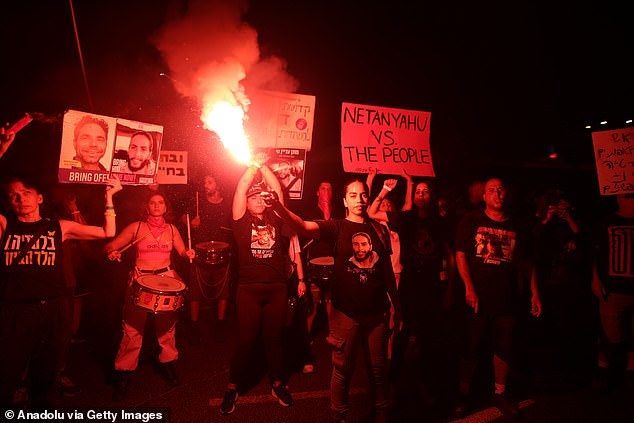
Thousands of Israelis gather with banners and Israeli flags to protest against Israeli Prime Minister Benjamin Netanyahu and his government for not signing the ceasefire agreement with Gaza and to demand a hostage exchange deal with the Palestinians in Tel Aviv, Israel, September 14, 2024.
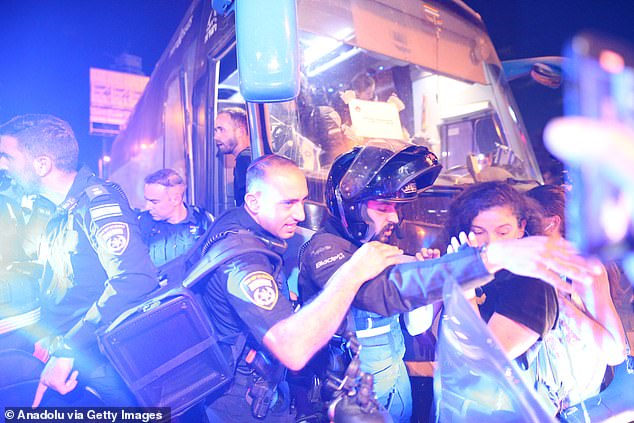
Israeli forces intervene as thousands of Israelis gather with banners and Israeli flags to protest against Israeli Prime Minister Benjamin Netanyahu and his government for not signing the ceasefire agreement with Gaza and to demand a hostage exchange deal with the Palestinians in Tel Aviv, Israel, September 14, 2024
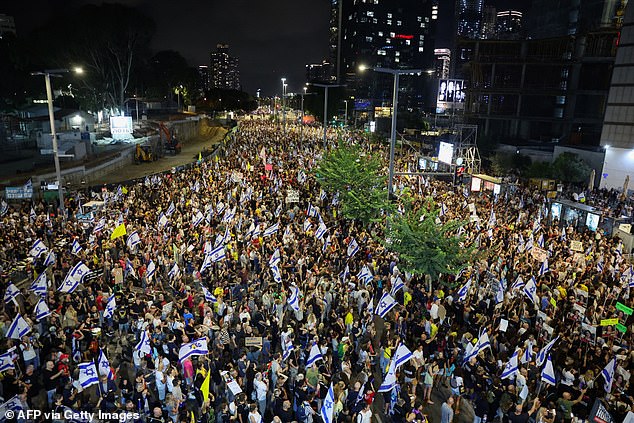
Protesters hold up flags and signs during an anti-government demonstration demanding action to free Israelis held hostage by Palestinian militants in Gaza since October.
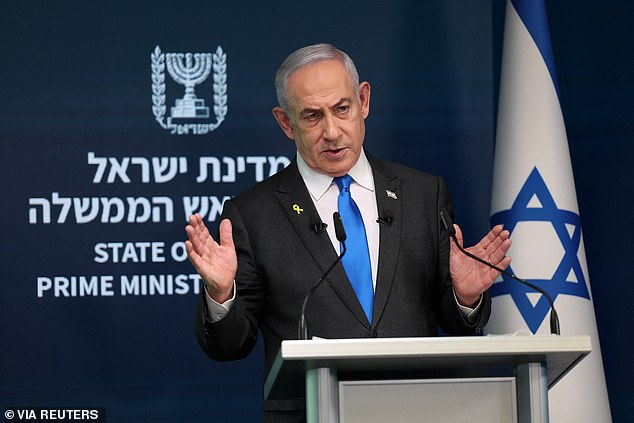
Benjamin Netanyahu (pictured) has been constantly criticized for his decision to carry out the military operation in Gaza.
The Israeli military said the surface-to-surface missile was intercepted by the Israeli defense system, which hit and fragmented the target but did not destroy it. It added that the missile appeared to have fragmented in the air. The military said the sound of explosions in the area came from the interceptors.
Yemeni rebels, known as Houthis, have repeatedly fired drones and missiles toward Israel since the start of the Gaza war between Israel and the Palestinian militant group Hamas, but nearly all of them have been intercepted over the Red Sea.
In July, an Iranian-made drone launched by the Houthis attacked Tel Aviv, killing one person and wounding ten others. Israel responded with a wave of airstrikes against Houthi-controlled areas in Yemen, including the port city of Hodeidah, a Houthi stronghold.
Israeli Prime Minister Benjamin Netanyahu hinted at a similar response in comments at a cabinet meeting after Sunday’s attack.
“The Houthis should know by now that we exact a heavy price for any attempt to harm us,” he said. “Anyone who needs a reminder is welcome to visit the port of Hodeidah.”
Brigadier General Yahya Saree, a military spokesman for the rebels, said they fired a ballistic missile at “a military target” in the Tel Aviv area.
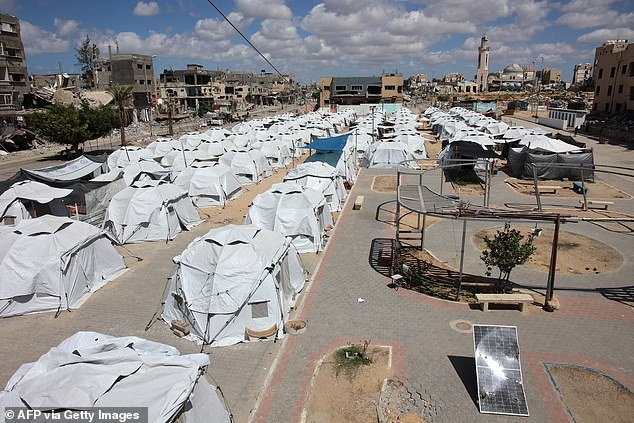
Rows of tents are set up for displaced Palestinians in Beit Lahia, northern Gaza Strip, on September 14, 2024.
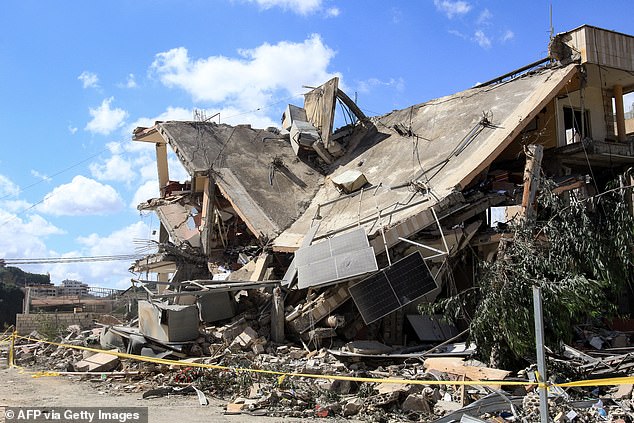
A building severely damaged in an overnight Israeli attack is seen in Kfar Rumman, near the southern Lebanese town of Nabatiyeh, September 14, 2024.
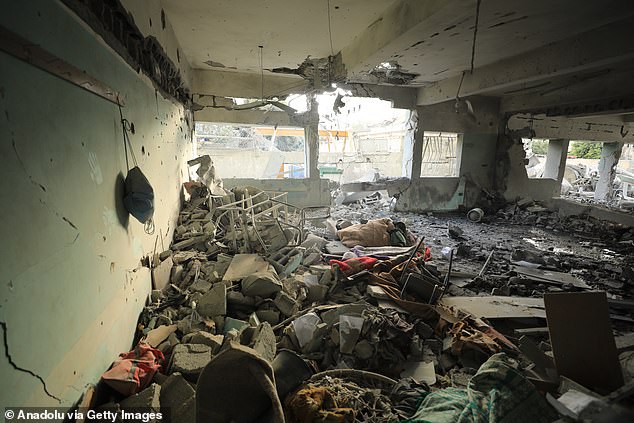
View of the destruction following the Israeli airstrike on the Zeitoun Martyrs’ School, a shelter for displaced Palestinians in the Zeitoun neighborhood of Gaza City, Gaza, on September 14, 2024
The Houthis have also repeatedly attacked commercial ships in the Red Sea, in what rebels describe as a blockade of Israel in support of the Palestinians. Most of the ships attacked have no connection to Israel.
On Sunday, a European Union naval mission operating in the Red Sea said rescue teams had begun towing an oil tanker that had been burning for weeks following a Houthi attack. Operations Aspides said the Greek-flagged Sounion was being moved to a “safe location.”
Hezbollah has said it would halt its attacks if there is a ceasefire in Gaza. The United States and Arab mediators Egypt and Qatar have spent much of this year trying to negotiate a truce and the release of dozens of hostages held by Hamas, but talks have repeatedly stalled.
In recent weeks, Netanyahu has insisted on continued Israeli control over the Gaza side of the border with Egypt, which Israeli forces captured in May. He has said Hamas used a network of tunnels under the border to import weapons, accusations denied by Egypt, which along with Hamas opposes any lasting Israeli presence there.
An Israeli military official said late Saturday that of the dozens of tunnels discovered along the border, only nine led into Egypt and that all had been sealed. The official, who spoke on condition of anonymity to discuss sensitive information, said it was not clear when the tunnels were sealed.
The discovery appeared to weaken Netanyahu’s argument that Israel needs to maintain open control of the corridor to prevent cross-border smuggling.
Egypt has said it sealed the tunnels on its side of the border years ago, in part by creating its own military buffer zone along the frontier.


